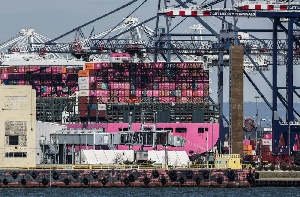- Home - Entertainment
- Lifestyle News
- Year In Review
- Music News
- Entertainers
- Entertainment Archive
- Entertainment Photos
- Jokes
- Entertainment Headlines
- Ameyaw Debrah
- Brown GH
- Celebrities Buzz
- GH Base
- Ghana Celebrities
- Gh Gossip
- GH Page
- GH Splash
- Hot Gossip GH
- YEN
Television of Saturday, 5 April 2025
Source: www.ghanawebbers.com
US starts collecting Trump's new 10% tariff, smashing global trade norms
U.S. customs agents started collecting President Donald Trump's 10% tariff on imports on Saturday. This tariff affects many countries, with higher rates for 57 larger trading partners starting next week.
The initial 10% "baseline" tariff took effect at 12:01 a.m. ET (0401 GMT). This marks Trump's rejection of the post-World War Two system of agreed tariff rates.
Kelly Ann Shaw, a trade lawyer and former White House adviser, called this action significant. She spoke at a Brookings Institution event, saying it is the biggest trade action in our lifetime. Shaw expects tariffs to change as countries negotiate lower rates.
Trump's announcement on Wednesday caused turmoil in global stock markets. By Friday's close, S&P 500 companies lost $5 trillion in value, marking a record decline. Oil and commodity prices fell sharply as investors sought safety in government bonds.
Countries first affected by the 10% tariff include Australia, Britain, Colombia, Argentina, Egypt, and Saudi Arabia. A U.S. Customs bulletin stated there would be no grace period for cargoes arriving after midnight on Saturday.
However, there is a 51-day grace period for cargoes loaded before that time. These shipments must arrive by May 27 to avoid the new duty.
On Wednesday at the same hour, Trump's higher "reciprocal" tariffs will take effect. European Union imports will face a 20% tariff while Chinese goods will incur a 34% tariff. This raises total tariffs on China to 54%.
Vietnam will see a 46% tariff due to shifts in U.S. supply chains from China. Vietnam agreed to discuss a deal with Trump on Friday.
Canada and Mexico are exempt from these new duties because they face separate tariffs related to fentanyl compliance issues under USMCA rules.
Trump also excludes goods subject to existing national security tariffs like steel and aluminum products and auto parts.
His administration released a list of over 1,000 product categories exempt from these tariffs. These exemptions cover $645 billion worth of imports for 2024 including energy products and pharmaceuticals.
The Trump administration is investigating several sectors for potential further national security tariffs.











